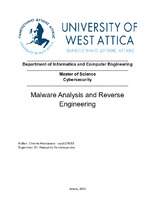Malware Analysis and Reverse Engineering
Ανάλυση Κακόβουλου Λογισμικού και Αντίστροφη Μηχανική

Μεταπτυχιακή διπλωματική εργασία
Author
Χρόνης, Αναστάσιος
Date
2023-03-09Advisor
Γιαννακόπουλος, ΠαναγιώτηςKeywords
Malware analysis ; Reverse engineeringAbstract
Malware is a constantly growing threat to both individuals and organizations as it can be
used to steal sensitive data, disrupt both minor and vital operations, and in some cases
cause physical damage to hardware and even humans. Reverse engineering is a
powerful tool for analyzing and understanding software, hardware and, in our case,
malware. It allows analysts to disassemble and decompile the code to determine its
functionality and identify vulnerabilities.
In this thesis, we present a comprehensive study of malware analysis and reverse
engineering techniques. We will begin by setting up a safe Lab environment, capable of
protecting the analyst while also providing them the tools needed to do their job.
The second part will be dedicated to Malware Analysis, starting with reviewing the
history and types of malware, before delving deeper, with tools and techniques used in
Static and Dynamic Analysis, code deobfuscation and closing with a concise workflow.
The third part will be reviewing Reverse Engineering tools and techniques as well as its
importance in a malware analyst’s repertoire.
We also discuss the ethical concerns of malware analysis and reverse engineering, like
the legal issues surrounding the possession and distribution of malware, as well as the
importance of a professional approach to the matter.
Finally, we will make a small statement about the future of Malware Analysis and
Reverse Engineering and provide use cases that Machine Learning can be used to help
the analysts secure an overall safer technological infrastructure.
Our work serves as an introduction point for cybersecurity analysts and computer or
software engineers that want to dig deeper into malware analysis.

